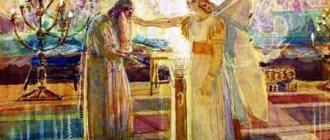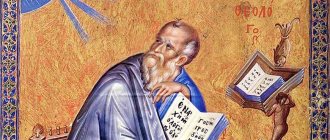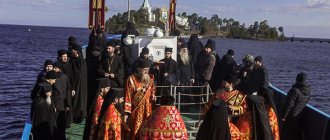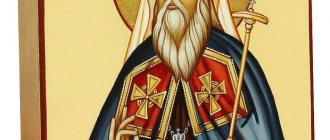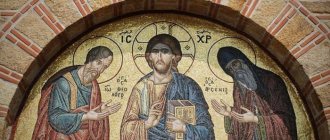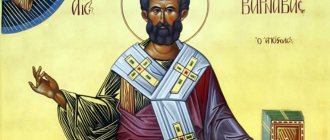№9-10 (84) / January 9 '98
Sermon
In this topic:
Sermon
Ascension of the Lord
“Prosperity of virginity, a pleasant dwelling place for honest virtues, an organ of wisdom, a spiritual temple, a luminous mouth of grace, the brightest eye of the Church, let us now praise the all-honorable John with spiritual songs, as a servant of Christ.” (Stichera on praise).
With these words of St. The Church calls us to glorify the Apostle of Love.
The history of the establishment of today's holiday is as follows: when St. John the Theologian lived to be a hundred years old, having worked hard in the gospel of Christ, he, together with his seven disciples, left the city of Ephesus and ordered them to dig a cross-shaped grave for him, in which he lay down and prepared to die.
Christians who lived in the city of Ephesus, after the death of the apostle, dug up his grave, but did not; found the body of the apostle; Having mourned his honorable death, they returned to the city and then often came to the grave and there they offered fervent prayers to God, calling upon St. for help and intercession before God. John the Theologian. Moreover, every year on this day and month, a kind of fine dust emanated from his tomb, creating healing. Believers collected these ashes and used them to heal various ailments and illnesses.
That is why it has become a custom among believers on this day, that is, today, to please and praise with hymns the confidante of Christ, beloved by God more than all other saints. Evangelist John, calling him both the Theologian and the head of Theology, the favorite and confidante of Christ, the virgin, the spectator of ineffable revelations and the teller of God's ineffable mysteries.
Dear brothers and sisters, St. The Apostle and Evangelist John the Theologian was a beloved disciple of our Lord Jesus Christ, and St. The Church called him the confidant of Christ, for he was the only one of the apostles who was worthy to recline on the chest of the Divine Teacher: “For he reclined on the chest, from whom you drew the dogmas of wisdom, as God’s blasphemer...” (I cried out the stichera to the Lord.)
The love of the Lord Jesus Christ for His disciple was expressed in the adoption by the Lord of His beloved disciple to His Most Pure Mother: “Disciple of the Savior, virgin and theologian, to you, as to a virgin, Christ God betrayed the Virgin and Mother of God with crucifixion...” (Stichera on the litia).
We heard the same thing today at the Divine Liturgy and in the Gospel reading in honor of the holiday, which tells that Christ, crucified on the cross, turned to His grieving Mother with the words: “Woman, behold your son,” and then to the mourner , to His beloved disciple: “Behold your Mother” (John 9:26–27) and thus handed them over to each other.
Why is St. The Apostle John became a particularly beloved disciple of the Lord, while the Lord equally called all the apostles to Himself and called them all His friends? This is because He appeared as that chosen and pure vessel who was able to contain the fullness of spiritual gifts, the fullness of theology and Christian virtues.
St. John was loved by the Lord, first of all, for his loving heart, for his virginity, for his bright and pure mind, for the fact that he was able to see the Word of life in his teacher. Only a loving heart forced young John to immediately leave his father’s fishing net, many fish, and follow Christ, as soon as he heard His words on the shores of Lake Galilee: “Follow Me.” Although at that time he was very young, his pure virgin soul was already completely engulfed in the flame of faith in the appeared Messiah and filled with love for this Heavenly Messenger. John’s love followed the Lord everywhere and everywhere and never left Him. John's love did not retreat from the cross while the faith of fiery Peter wavered and the hope of the other apostles dried up. His love followed the Divine sufferer both to the court of the high priest and to Golgotha. In this selfless and sincere love, nothing could separate John from his Divine Teacher and Friend: “neither death, nor life, nor the present, nor the future” (Rom. 8:38). St. John preserved this love until his very blessed death, and his entire long life was nothing more than an active manifestation of this love in suffering for the Lord and in unceasing preaching about Him as the God of love and mercy. It was only thanks to such love that he was honored to be a direct witness of the terrible suffering on the cross of the Lord Jesus Christ for the entire sinful human race, and this same love helped him to be the first to be convinced of the reality of the resurrection of the Savior.
For his special love, for his tenderly loving heart, filled with virgin purity, he was honored to be a spectator of God's ineffable revelations, and was honored to penetrate into their depths. He, filled with divine love, alone among the apostles became the head of theology. Reading the Gospel he wrote, we see to what height of theology he ascended, and at this height of theology the most ineffable secrets of Divine life became accessible to him. With the flight of his theological thoughts, he was like an eagle soaring high above the world, and in the depth of its content, his teaching about God can be compared to the depths of the sea. His theological thoughts are the support of the most important parts of the Christian teaching about God. His Gospel is distinguished by its special spirituality, which he began alone with sublime thoughts: In the beginning was the Word, and the Word was with God, and the Word was God.”
Let us remember that on the day of Holy Pentecost all the apostles, filled with the Holy Spirit, were honored to be participants in the economy of our salvation, but none of them could expound the teachings about the essence of God, about the mystery of the Holy Trinity, about the ways of rebirth and salvation of man with such completeness, with which St. John. That's why St. The Church is the first to adopt the title of Theologian.
The Church knows only three such chosen ones, initiated into the Divine mysteries: Apostle John the Theologian, Gregory the Theologian and Simeon the New Theologian. St. John the Theologian, initiated into the incomprehensible mysteries of God, enlightened all people, flowing from his lips rivers of theology, and watered the Church of Christ with the true teaching about the Holy Trinity: “The rivers of theology flowed from your honest lips, apostle, from them the Church of God is watered , Orthodox worships the Trinity of one essence” (Stichera on the lithium).
Why St. Did John the Theologian receive special gifts in the knowledge of God for his Divine love, for his blessed virginity? Because love is the basis for knowledge of God. The Apostle himself in the knowledge of God gives the main place to the loving heart, for only a man of perfect love, a man of a loving heart can draw much from the mysteries of God. Love is capable of penetrating everywhere, even into the realm of the most intimate and incomprehensible. Only love can know God, since God is love. And if God is love, then this boundless love can be known under the condition of the same love, for “whoever does not love has not known God, because God is love” (I John 4:8).
In addition to a loving heart, perfect purity of heart is necessary for knowledge of God: “Blessed are you who are pure in heart, for you will see God.”
Revealing his deepest thoughts about God, St. John the Theologian says most of all that God is Love. St. John the Theologian, the Apostle of Love, constantly preached about love for God and for each other and bequeathed to us to love God, because He first loved us. In the last years of his life, he constantly repeated the same words: “Children, love one another.” When he was asked why he repeated the same words, he replied that if someone fulfills this commandment, then this is enough for salvation.
Beloved, the cornerstone of our salvation is love and faith in our Lord Jesus Christ as the Son of God.
Our love should not be in words, as the apostle considers love, but in deeds.
Active love leads us to God through communication with each other. Such love leads us to perfection, to the knowledge of God, and brings us closer to God. Knowing God, we again improve more and more, gradually climb the ladder of moral improvement and thereby achieve perfect love. Such love makes us capable of eternal, heavenly life, where Light, truth and purest love dwell.
In today's apostolic reading we heard that God is Light and in Him there is no darkness (I John 1:7). And if you and I walk in darkness and say that we have fellowship with God, then we are deceived and act against the truth.
So, dear brothers and sisters, we come to know God through active love for our neighbors. If we love God, then we must fulfill His commandments, which tell us about mercy towards our neighbor. The Apostle Paul said that without love, all our deeds are empty sound.
Let us love each other with all our hearts, and through this spiritual love we will be worthy to dwell in God forever. On today's holiday of love, let's pray to St. Evangelist John the Theologian, so that out of love for God he will help us to acquire, to the best of our ability, spiritual gifts. Through his prayers, we too, to the best of our ability, will be worthy of knowledge of God, which will lead us to true love, in which there is no guile, envy, deceit, malice, but in which truth and peace reign. According to the measure of our love, may there be peace among us, peace in our homes and our families. Abiding in love, we will abide in God. Amen.
Archpriest (then 2nd year student) Vasily SEMENOV
May 21, 1956 Ekaterinburg
In other rooms:
Sermon on the day of remembrance of the Apostle and Evangelist John the Theologian. Archimandrite Matthew (Mormyl)
In the name of the Father, and the Son, and the Holy Spirit!
God is love, and abide in love, abides in God, and God abides in him
(1 John 4:16).
“The garden of purity, the ointment of incense was heaped upon us,” brothers and sisters, on the coming holiday, on which we prayerfully glorify the one who for more than half a century spread the gospel of Christ in a union of peace and love and dispersed the “proper darkness of tongues”... And how can one express it in words? everything that the holy Apostle John accomplished with his holy “zeal for God”? “Your greatness, virgin, who is the story? - we sing through the mouth of the Holy Church. “For you perform miracles and pour out healings, and pray for our souls as the Theologian and friend of Christ.”
The Holy Apostle John is the first most perfect Theologian, the final stone of the church arch - revealed truth and Christian life. His heart burned with love for God and his neighbors, it was full of heavenly feelings and the flame of the Divine. Love is the beginning of true knowledge of God and the main basis of the Christian educational activity of the holy evangelist.
Thanks to his love, he became, in the words of one of the stichera, “a spectator of ineffable revelations and a teller of the highest Mysteries of God.”
Illuminated by the light and spirit of this love, he announced to us that God is “ the true light
"(John 1:9) and we need to be "
children of light.
God is spirit ” (John 4:24), says the holy apostle; therefore, we must be born in the spirit and live in the spirit in order to enter the Kingdom of God.
As the confidant and friend of Christ, the holy Apostle John “ was in God and God was in him
“, therefore he proclaims that “
God is loving
” (1 John 4:16). God's love for us is the main subject of Christian teaching, and our love for God is the basis of Christian moral teaching and the root of all virtues.
Archimandrite Matthew (Mormyl)
«For God loved the world, for He gave His only begotten Son to eat, so that everyone who believes in Him will not perish, but may have eternal life
"(John 3:16).
How Christian wisdom is “ wisdom from above”
"(James 3:17), so Christian love flowed and flows from the Heavenly Source of Divine love.
Only the living and continuous connection of Christian love with Divine love makes the former full of mercy and good fruits.
Warmed and enlivened by Divine love, the love of a Christian receives supernatural power - it does wonderful things. Who will separate us from the love of God?
- asks the Apostle Paul, -
is it tribulation, or oppression, or persecution, or famine, or nakedness, or trouble, or sword?
And he himself answers: “
We know that neither death, nor life, nor angels, nor beginnings <...> neither the present nor the future <...> nor any other creature can separate us from the love of God, which is about Christ Jesus our Lord
.” (Rom. 8:35-36).
So, Christian love is the only worthy response of the human soul to the highest love of God, manifested in good deeds, and especially in the Redemption. “ We love Him, as He first loved to eat us
"(1 John 4:19), - the now glorified holy apostle testifies on behalf of redeemed humanity.
Christian love is not just an outpouring of pious feelings of reverence, gratitude and devotion to God. Throughout a person’s life, love for one’s neighbor must also appear in indissoluble unity with love for God. The commandment to love others is an expression of the commandment to love God. " If anyone speaks
“,” says the Apostle John, “
because I love God, but hate my brother, that is a lie: for if you do not love your brother, he is the same as God, but you have not seen Him, how can you love?
"(1 John 4:20). This divinely established and saving union of both commandments of God’s law is true love.
Only such love will be merciful, long-suffering, not seeking evil, not rejoicing in untruth, but rejoicing in the truth. Only such love covers everything
and is a miraculous love, for “everyone who loves his enemy,” says St. Demetrius of Rostov, “is a miracle worker!”
And there is only one such love, which will never fall away
and which will live forever.
Clement of Alexandria tells about Saint John: when the apostle went around the cities in Asia, in one of them he saw a young man with a soul disposed to goodness; the holy apostle baptized him. Leaving for the sermon, he entrusted it to one bishop. The bishop, taking the young man into his care, taught him Divine truths, but did not give him proper education and left him to his own will. Soon the young man began to lead a bad life and, carried away by his friends, became a robber, who made him their boss. Returning after some time, the holy Apostle John, having learned about the life of the young man and, moved by love and compassion for the perishing soul, goes to the camp of the robbers in order to return his young man to his former pious life. The young man, who instilled fear and horror in those driving along the surrounding roads, saw the holy elder coming towards him, was ashamed and wanted to hide in the desert. The holy apostle, forgetting his old age, ran after him, crying: “My son! turn to your father and do not despair of your fall; I take upon myself your sins; stop and wait for me, since the Lord sent me to you.” The young man stopped and fell at the feet of the saint with trepidation and great shame, not daring to look him in the face. The holy elder picked him up from the ground, hugged and kissed him with fatherly love, and brought him into the city, rejoicing that he had found the dead sheep.
Brothers and sisters! From this example we see an example of Christian love. In the person of the holy Apostle Evangelist John the Theologian, Christian love lives and does not die on earth, and as the Holy Scripture says: “ Now this word went out to the brethren, for that disciple shall not die.”
"(John 21:23).
Let us offer our earnest prayers to the all-praised evangelist of peace and love, let us ask him to kindle in our hearts love for God and our neighbors, so that he will protect us until the end of our lives, so that we can fulfill his words: “... My children, we do not love in word below the tongue, but in deed and truth"
(1 John 3:18). Amen.
Archimandrite Matthew (Mormyl)
May 21, 2020
Share
Church of St. Spiridon Trimifuntsky of Pokrovsk (Engels)
We celebrate today the day of St. John the Theologian, teacher of love, Apostle of love. And it seems to us that this love should be so fiery and sublime that it should rush into the sky, as if not even touching the ground. And at the same time, the love that the holy seer John, who wrote the wondrous Gospel and had a vision on the island of Patmos, speaks about is concrete, living, real love. And he insists on this, emphasizes that if we say that we love God, but do not love a person with active, concrete, creative love, then we are lying; for we cannot rightly say that we love God, invisible to us, when the real person, whose need is striking, remains indifferent to us. And here is the secret of true Christian love: no matter how sublime it is, no matter how it carries us to the Throne of the Lord, no matter how it blazes with a heavenly flame, it must be completely concrete and fully expressed on earth. If this is not the case, then it is a dream, then it is a lie, then it does not exist at all!
And so, in the face of this gospel of love, let us enter into ourselves and think about our love: how many people are around us whom we simply love; and how many people, among those supposedly loved by us, who can bypass us with their attention - and we would not be offended, pass by us and forget about us - and our love would not cool? How many people are there among our loved ones that we always remember without them needing to be reminded of themselves? And how many people are there who will remind themselves - and will be met only with joy, and not with a feeling of irritation?
It’s too early for us, for the most part, to think that we love such a small number of people, but it’s time, it’s time to think about how we love those we love, how we love those who seem to be dear to us: if this is a living, creatively thoughtful love , if this love is able to seek out an opportunity to manifest itself, if it is sensitive, if it is subtle, if it is constantly on the alert, then this is earthly love worthy of Heaven. Otherwise, no.
Let us enter into ourselves in the face of this beauty of love, which John describes to us, which is revealed in his life, which Christ not only preached, but also revealed, let us think about our love and try to LOVE: first in a human way, but truly, worthy of a person ; and then we will gradually grow to love one more person, and with an even better love, expand this love, embrace more and more people with affection, understanding and the sacrifice of our lives. And then we too will gradually grow to understand what the love of Christ is; and some day we, perhaps, will be given at least one person, according to the word of the Apostle Paul, to receive as Christ receives us! Amen.
Metropolitan Anthony of Sourozh
Views: (128)
Share:
Days of remembrance of saints
Church of John the Baptist on Krasnaya Presnya in Moscow. (1968)
I want, firstly, to greet all of you not only on my own behalf, but also on behalf of those who came here with me, Father Archimandrite Peter, rector of the French Orthodox parish in Paris, and Father Sergius, rector of one of our parishes in England, who is also Associate Professor at one of the English universities; and from all of us, Orthodox, to greet the priest of the Anglican Church standing here on the salt, who, together with his bishop, brought greetings and brotherly love to our Holiness the Patriarch and our dear Church from his people and his Church.
I also want to tell you a few words about the saint who is the patron of your temple.
According to the testimony of the Lord, no one born on earth was as great as Saint John the Baptist. And when you think about the testimony of the Gospel about him, it really takes your breath away. But not only is it breathtaking: you see in him the image of a man who was able to be so infinitely, so unlimitedly devoted to his God and his earthly calling and who can serve as an example and image for each of us, because each of us, in some sense, in relation to to those around him is so often the forerunner of the Lord, the one whom the Lord sent ahead of Himself to bring people a word and a way of life that would prepare them to understand Christ, to accept Christ. And when with our lives we disgrace our testimony, when, looking at us, people cease to believe both in our words and in the words of Christ, then we take on a terrible responsibility. We not only live in judgment and condemnation for ourselves, but we do not draw others with us to where we are called to lead them: to joy, to that joy, the guarantee of which the Lord has left us and which no one can take away, but which no one, except the Lord, he cannot give.
Let us recall several of the expressions that were used by Christ or the Gospel in relation to the Baptist John. The first thing we hear about him is that he is the voice of one crying in the wilderness. The desert is not only an uninhabited place, it is a place where it is empty; and so often in the human heart it is “empty”, in human life it is “empty”. Not only is there no eternal content, but there is generally no such content by which one could live. And in this regard, we are surrounded, all by a human desert. And in this desert we too are called, like the Baptist, to bear witness. The testimony of John the Baptist did not begin with words: before returning to people and speaking, before imperiously demanding from them that they become worthy of their calling as men, he himself withdrew into the bare, hot desert and was left alone with himself, face to face with himself. yourself before the eyes of God.
Sometimes we have to be left alone like that. This happens when our neighbors leave us, when everything around us becomes empty. This happens when we are touched by illness, and then, no matter how much we are surrounded by care, we feel that we are alone, because we stand in the face of life and death where each person alone will decide the issue of life and death - not only temporary, but also eternal. It happens that we withdraw ourselves in order to come to our senses, and then we know how difficult it can be to be alone with ourselves when we are not used to it: we become afraid - then our inner emptiness opens before our own eyes, and into this emptiness, into this desert we must enter. It will be lonely there, it will be empty there, it will be difficult to live there, but only if we are able to live in this desert, with God alone, can we return to people, never losing God and being able, having conquered ourselves, to conquer everything.
And so John remained alone in the desert for over thirty years, struggled with his heart, struggled with his life, and went out to preach and was certified by God as the greatest - but not only. The Gospel calls him not a prophet, but a VOICE. He became so close to the will of God, so became one with that life-giving word that he must pronounce to save people, to awaken people, so that life would also shine in them, joy would be revived, that he was ONLY a voice. It is no longer a man who speaks: it is God who speaks with his voice. That's what the saints said. One of the ascetics of Athos, who died not so long ago, said: Saints do not speak for themselves; they speak from God, and only...
John rejected everything earthly in order to belong to God, and the Lord returned him to this earth. The Lord did not leave him in the distant desert: when John became inseparable from Him, the Lord sent him to the people, so that people could live the life that John knew. And so the question is posed to each of us: is there such a life in me that I can ignite another person? Where is this life in me? When people meet me, do they light up? When people hear me, does their heart tremble - as the Gospel says about the companions of Emmaus, “the heart burned” in them? When people see our life, do they really say about us, as they did about the first Christians: How they love each other!.. Are they surprised, when they hear, when they see us, that we have something that no one else has? And if this is not so, then we have not even followed the path of our predecessor, we are not ready to bring Christ to people, we are not even ready to pave the way for Him so that He somehow finds a way for Himself. And we are called to be those who prepare joy for people, the joy of meeting God, a joy that will never end and which no one, nothing can take away. Why? Because we want to live on our own rights, we want to live for ourselves, we don’t want to fade away.
But this is what the Gospel says about John the Baptist. Testifying to people about who he himself is, the Baptist says: I need to decrease, to come to nothing, in order for Him to grow to its full measure... John himself is only the Forerunner; he must open the door and step away so that people will no longer remember him, suddenly seeing Christ and forgetting everything in this joy.
To come to nothing, having prepared the way of the Lord... Which of us knows how to do this? Which of us, having revived someone’s soul, even with a kind word, does not want to remain in this joy of mutual communication? Who, having said a life-giving word, sometimes accidentally, when the Lord gives it to us, does not want them to remember and never forget that this word was spoken to them?
And the Baptist also says about himself: I am the friend of the Groom... What kind of friend of the groom is this? In Jewish, as well as pagan, antiquity, the groom had a friend who took care of everything for the marriage and who, after the marriage, brought the bride and groom to the wedding room, remained behind the door and watched so that no one would interrupt their deep, mysterious meeting in the wondrous wedding love. He was a friend because he knew how to stay outside the door, to stay outside the limit. His joy was complete because the joy of the bride and groom was now complete, they were left alone, and he was the defender of this meeting. I’ll also say: which of us knows how to do this with someone else’s joy? Do everything to make this joy happen, do everything so that it shines with eternal light, and then move away, protect it, protect it, and remain forgotten behind a closed door?
Here is another image about him, the last image. His diminishment, his descent into nothingness, has reached almost its limit. He was taken to prison for his truthful, honest word. Christ remained free. He preaches, John's disciples came to Him, He is surrounded by His disciples. He grew into the full measure of His earthly calling. And John knows that death is coming towards him, that he will not leave prison, and suddenly he is overcome by doubt. He, who on the banks of the Jordan River testified in front of everyone who the coming Christ is, sends two of his disciples to Christ to ask: Are you the one we were expecting, or should we expect someone else? In other words, to say: “Are you really the one about whom I bore my testimony, or am I mistaken?”... If he was mistaken, then in vain he wasted his youth in the desert, in vain he went out to people, in vain he is now in prison, in vain he will die, in vain EVERYTHING. Even the testimony that he brought to Christ is in vain, and he is deceived by God Himself... And the strongest soul that has ever been on earth wavers. And Christ does NOT answer him. He does not take away from him the fullness of the feat of faith and the feat of fidelity to the end. To the disciples who question Him, He says: Tell John what you see: the blind see, the lame walk, the poor preach the gospel; Blessed is he who is not offended because of Me... Words once, centuries before, written by the prophet Isaiah. And they come back with this word. It remains for John to go inside himself and ask himself the question: when he was in the desert alone in the face of God, was it true or an inner lie? When he came out of the desert to preach and shocked people, renewed their lives, led them to new life, to newness, to spiritual spring - was it true or not? When he saw Christ and saw the Coming One in Him, was it true or not?.. And John died in faith and in unconditional fidelity.
How often does it happen that our soul hesitates, that after we have done everything that we had to do, we have said a good, truthful word, we have done everything we could so that another person would come to life with joy and be resurrected in soul and begin to live the spring life of eternity, - suddenly there is a hesitation... The soul is tired, life is fading, our head is bowing to the ground... Was it all worth doing? I don’t see the fruit, I don’t know what will happen, but I have ruined so much faith, so much love. Was it worth doing all this?.. And the Lord does not answer us with evidence of “success”. He tells us: It’s enough that it was all true, that it was all good, it’s enough for you that you did what you had to do. This is everything.
And so, before each of us stands this image of the Baptist. Each of us is sent to each other, to each other, as a Forerunner, to say a word so pure, so free from ourselves, from selfishness, from vanity, from everything that makes our every word petty, empty, insignificant, rotten; do we do this willingly to come to naught, if only this person would grow into a living person, the “bride” of eternal life? And when all this is done, am I ready to say with joy: “Yes, let the last thing be accomplished, let them not remember me, let the bride and groom meet, and I will go down into death, into oblivion, and return to nothingness.” Are we ready for this? If not, how weak is our love even for those we love! What can we say about those who are so often alien and indifferent to us?
So, let us often, often look at this majestic, but human image of the Baptist, and we will learn how a real, whole person lives, and we will try to live at least in small ways, with all our might, even if there are few of them, but without a trace, to the last drops of our living force. Amen.
| Public Committee "For the Moral Revival of the Fatherland" All sermons | Sermons by Archpriest Alexander Shargunov |
SERMONS
Apostle John the Theologian
Archpriest Alexander Shargunov
Christ is Risen!
Congratulations to everyone on the feast of the Apostle John the Theologian. His name means "grace." And his word, permeated with the light of grace, resounds in the Church from Easter night, when eternal life is revealed to us, until Pentecost, until the Feast of the Most Holy Trinity. The Gospel of John, his three Catholic Epistles and Revelation - all this was written with love. This is a special, so-called “Johnnian script”. The Apostle John the Theologian wrote his Gospel after the three Gospels of Matthew, Mark and Luke were written. Christ told His disciples: “I still have much to say to you, but you cannot bear it now.” But now the Church, sanctified by the grace of the Holy Spirit, can accommodate more than during the earthly life of Christ. And the word of the Apostle John the Theologian, by the eternal memory of the Holy Spirit, restores what is not in the other Gospels. He is the only one who can talk about what other evangelists do not talk about. About the first miracle that the Lord performed in Cana of Galilee - a miracle that was a prototype of His death on the Cross and the gifts of the Life-Giving Spirit to all humanity. From him alone we will read about Nicodemus’ night conversation about the secret of eternal life, about being born again, and about his conversation with the Samaritan woman. He alone has a story about the resurrection of Lazarus, about the Last Supper, when the Lord washed the feet of the disciples. Chapters 13 - 17 of the Gospel of John are a conversation about the Holy Spirit before the descent of the Spirit, before the Passion of Christ. The memory of love imprints everything. As it is said about the Mother of God that She “laid everything down in Her heart,” so we can say about the Apostle John the Theologian. This is because he stood where only the Mother of God could stand - at the Cross of Christ, and at the Last Supper he reclined on the chest of the Lord. And he alone could ask: “Who is the betrayer of Thee?”
What was said in his ear, he proclaimed on the housetops. His name is Boanerges - "son of thunder." From the lips of the Apostle comes the preaching of the word of God—the heavenly word of grace. His symbol is the eagle, and he has the vigilance of an eagle, the ability to see from a spiritual height the smallest details of the earth, the ability to look straight into the shining Sun of truth. And all this so that we learn the secret of love that the Lord brought and which the Apostle John the Theologian learned. He is a beloved disciple of Christ because he has learned the secret of love. He is a witness of the Lord, and his testimony is true - a testimony of the love of Christ - because he learned this love.
Two events from the life of the Apostle John the Theologian should always be before us, like marks on the margins of his icon. The first is when he met one remarkably handsome young man and handed him over to the presbyter of the Church, so that he would take care of him, saying that he would ask him for the soul of this man. After some time had passed, he returned and asked where the young man was. They answered him that he had died - a spiritual death. Having been baptized, he recognized grace, but, seduced by the devil, he committed a crime and, hiding from persecution, left the city. A group of criminals formed in the mountains around him, and he became the leader of a band of robbers. The Apostle John the Theologian, an elderly man, went to the mountains and deliberately fell into the hands of this gang. When he appeared in front of their leader, he saw who was standing in front of him, and out of shame and fear he could not stand it and ran. The gray-haired old man ran after him, begging: “Stop, there is still hope!” I myself will stand before the Lord Jesus Christ for you. Just as the Lord died for me, so I am ready to die for you. Christ Himself sent me to you so that you would return.” This man stopped, the weapon fell from his hands, and he, crying, threw himself into the arms of the Apostle John the Theologian.
The second episode described in his life is a visit to the Ephesian baths, a social club of that time. As soon as John the Theologian learned that the famous heretic Cyrinthus was there, who taught that there was no incarnation of Christ, then he shouted to his disciples: “Let's run away from here immediately! Now the walls themselves will collapse because of the presence of wickedness and because we are present where this wickedness is, mingling with it.”
We see, on the one hand, his living participation in another person, even one who has fallen away from God, from the Church, and on the other hand, intolerance towards any heresy, towards satanic lies. We remember the words of the Apostle John the Theologian: “Whoever says, ‘I love God,’ and hates his brother, is a liar” (1 John 4:20). The Apostle John the Theologian denounces such false piety when they say: “I love to pray because I love God,” but they do not love their brother. Who is brother? - ask Blessed Augustine, St. John Chrysostom and many other holy fathers. A brother is every person without exception, including those who are outside the Church. Like a robber, after whom the Apostle John the Theologian ran, begging him to return to Christ, willingly to take upon himself the consequences of his sins. This is what the Church is called to do. And today we pray: “Beloved Apostle of Christ God, pray to the Lord, who has fallen into Persia, to drive away the present darkness of tongues.” That darkness, that pagan darkness that surrounds us with wickedness, so that the Holy Church, and those who belong to this Church, have this living attitude towards the truth, which is love.
Another word of the Apostle John the Theologian, heard today from his Message, warns that we must learn true spiritual life, and not seek some kind of spiritual experiences, because every spirit that does not confess Christ, who has come in the flesh, is not from God, but there is the spirit of Antichrist. This means that we can be called disciples of Christ only if we oppose all false spirituality, all Satanism. This also means that if we do not embody in our lives the mystery of love that Christ brought, then we remain in false spirituality and deny the Incarnation of Christ with our lives.
And the entire word of the Apostle John the Theologian is filled with this unconditionality: either God or the devil; either light or darkness; either true or false; either life or death. You can't connect one to the other. One is connected to the other due to the fact that we have fallen away from God, and due to the fact that death has entered our lives, and sin reigns in us. But after Christ came, we no longer have an excuse for the fact that this continues in our lives. This is the truth. And whoever does not see this truth is lying. And at the same time he represents God as deceitful in his madness. But whoever sees this in the light of Christ and confesses his sin, the Lord washes with His Blood from all sin in the sacrament of the Holy Eucharist, in the sacrament of repentance, when we commune with the Lord of this new life of His, about which John the Theologian speaks so inspiredly. What we have seen, what we have heard, what our hands have touched, that true life has appeared, and we want your joy to be complete (1 John 1:1-4). Perfect. Not so much and not so much joy, but complete joy, that joy that God always has, which John the Theologian wants to share with us, so that we have fellowship with the one with whom he has fellowship. With whom the Church always has communion, so that we may be holy in this Church.
A person must fully recognize his sinfulness and, with all mercilessness towards himself, understand what sin is. And if some sin is not fully confessed and realized, there is no love. This complete unity with Christ does not yet exist. The depth of repentance is determined by the depth of love. Everything is determined only by this love, but the path to it is the whole life and death of Christ, our whole life and death.
May the Lord grant us to see this mystery of true life, light, love, which the Apostle John the Theologian proclaims, and to all be beloved disciples of the Savior. Now, having accomplished everything necessary for our salvation, He sees each of us as the person most dear to Him, as those for the sake of whose salvation He reveals to us the secret of His Divine love. Amen.
All-night vigil May 20, 1998
© Public Committee “For the Moral Revival of the Fatherland”
Russian Orthodox Church
On October 9, 2011, on the day of the repose of the Apostle and Evangelist John the Theologian and the day of remembrance of St. Tikhon, Patriarch of Moscow and All Russia, His Holiness Patriarch Kirill led the service of the Divine Liturgy on the Square of the Great National Assembly - the central square of Chisinau. After reading the Gospel, the Primate addressed those gathered with a sermon.
In the name of the Father and the Son and the Holy Spirit.
I am glad to see you all, my dears, in this square on the day when the Lord vouchsafed me to arrive in Chisinau. The heavens have opened, but for the exhausted earth, which has not received moisture for almost three months, this day is a blessed day. But in a sense, God’s blessing is always associated with some inconvenience for a person, because in response to God’s blessing human efforts are required.
Today, on the day of remembrance of the holy Apostle and Evangelist John the Theologian, we heard an excerpt from his message (1 John 4:12-19). Amazing words were spoken that help us understand much in the life of a modern person. It seems to each of us that the worst thing in life is pain. A person suffers from pain both mentally and physically, and everyone strives to avoid it. But the apostle teaches us that there is something more terrible than pain - it is fear. “In fear there is torment” - torment not so much from pain, but from fear itself, from horror. These amazing words amaze the mind, and our modern life gives us plenty of evidence of the correctness of these fiery words of the apostle and evangelist.
Indeed, fear affects a person. It is not without reason that modern philosophers and medical experts say that the current civilization, the current society primarily suffers from stress. We are really afraid of many things. We are afraid of getting sick, we are afraid of being deceived, we are afraid of losing or losing - losing an election, losing an argument, losing in a competition. And most of all we are afraid of old age, illness, loneliness and, finally, death. It is not known whether a person will be struck by illness, but he is afraid of illness; it is unknown whether a person will lose an argument, but the very fear of losing instills fear in the soul...
These fears of modern life are revealed to us as a kind of stamp of the ill-being of human society. In fact, the modern world is designed in such a way that it reproduces false values. As a model of well-being, the world offers a person material well-being and pleasure: have more money, more comfort, take advantage of all this - and you will be happy. It is the psychology of a person, striving for pleasure and external well-being, that turns out to be extremely vulnerable. This is where fears are born, because well-being can be taken away at any moment, and at any moment a person may find himself unable to enjoy life. What then? And then fear and horror. Today, society has put the reproduction of horrors and nightmares on stream. It is enough to watch television programs, films, news blocks: constant images of nightmare and horror; and when a person, striving for external well-being, for pleasure, looks at these pictures, he falls under the power of fear - this is where stress and spiritual ill-being arise. In addition, fear becomes a kind of tool for manipulating human consciousness. With the help of fear, one can achieve political or other goals - a person living in fear becomes easily controlled, he loses freedom.
What does Saint John the Theologian teach us today? He teaches us the greatest wisdom - how to overcome fear, how to overcome stress, how to maintain inner freedom. His wondrous words were heard today in this square: “Perfect love casts out fear.” This may seem incomprehensible to some, but these words contain the greatest wisdom. Through them, a person wins over any fears and becomes courageous and invincible. It is no longer the circumstances of life that dominate a person, but the person becomes stronger than the circumstances.
What is perfect love? Does it even exist? The apostle answers: yes. He says that God Himself is Love, and he who abides in love abides in God, and God abides in him. This means that the human community, which expels God from its life, is doomed to fear, and this fear will only increase so much that it is unknown what will remain of the human personality. But when we live with God, we become strong. We are not afraid of anything, we surrender our lives to the will of God, we try to hear His voice, we grow wings, we are able to fly, we are able to overcome any difficulties in life - personal, family, public, and state - because God through love frees us from fear.
And after all, John the Theologian himself set an example of this when he, the beloved disciple of the Savior, was not afraid of Golgotha. The other disciples fled, and he, together with the Mother of the Savior, stood at the Cross, fearing nothing - neither the Roman soldiers, nor the anger of the high priests, nor the wild screams of the raging crowd. He stood at the Cross, conquering fear, because with God in the heart, fear disappears. And today, praying to the holy Apostle and Evangelist John the Theologian, we will ask him, now standing before the throne of God, as he once stood at the Cross, to strengthen our faith in God, and through this - love in the heart, perfect love, which casts out fear and helps man, overcoming all the difficulties of earthly existence, strives for the true goals and values that God Himself destined for the human race. Amen.
Press service of the Patriarch of Moscow and All Rus'
Optina Pustyn
In the name of the Father and the Son and the Holy Spirit.
Dear brothers and sisters in the Lord, we sincerely congratulate you on the day of remembrance of our beloved Apostle of Love John the Theologian. Today at the Divine Liturgy two readings were read. The first, according to the service regulations, is private, and, like every day, private reading is not canceled. The second one is actually dedicated to him. But both of these Gospels are about John the Theologian. In the first Gospel, the Lord tells us extremely deep and important things. He says that I am the true vine; and a rod (part of the vine) that does not bear fruit, then such a rod is destroyed: cut off and burned (see John 15: 1-6). And now we must immediately think about what fruit the Lord is talking about here. We also know from the Holy Scriptures, from the words of the Apostle Paul: he who created the world has greater truth.
Fruit is not some external thing that is achieved by people, some work successfully done, some achievement in everyday life. All this externality will burn on the last day of the world's existence before eternity begins. All this will burn and disappear. That is, all this external stuff, which in the Gospel is called foreign and unrighteous, although very much of what we have seems to be like ours, and seems to have been honestly acquired, but it is called foreign because it is not real. You can't take anything from there to the next world. It is called unrighteous because in relation to the eternal good it is all completely false and empty. Therefore, the achievement of these external earthly fruits is never meant. This world-creator has more truth.
And so the Lord says further very important words, that if the vine does not remain on the rod, then it will not bear any fruit. That is, we must abide in Christ. The vine is Christ, the rod is the members of the body of Christ, that is, the members of the Church. The Church is not a temple, it is not just a society of people who believe with the same faith. This is a divine-human organism united by the grace of the Holy Spirit. And so, if a person who externally belongs to the Church does not have internal fruit, it is a dead rod that does not bear fruit, which will be burned. There will be no benefit. The Lord here very deeply and clearly shows us that we need to abide in Him. How to abide in Him? Well, of course, to put it in the most direct words, this refers to holy baptism: he who eats my flesh and drinks my blood abides in Me, and I in him (John 6:54). Today we are all going to take communion. And of course, the person who has received communion abides in God. But it is not only this communion in itself that gives all the spiritual fruit. The person is prepared for communion. It’s impossible to talk about this now. It is too long. Not everyone who receives communion receives communion without condemnation. It also happens, as we know from patristic literature, that one can receive communion even under condemnation. We won’t talk about this now, because we simply don’t have the opportunity or time. We are talking about something else now.
Here the Lord says: “abides in Me.” How does he abide in Him? Here the apostle explains that we understand that we abide in Him and He in us, that He has given His Spirit to us to eat (1 John 4:13). The Lord gave us the Holy Spirit. This is evidence that the Spirit abides in God, and God abides in us. Yesterday, by the way, they read proverbs to us at the evening service. This was the reading of the first proverb. How can we know that the Holy Spirit dwells in us, that the Lord has given us of the Spirit? Firstly, according to the correct dispensation of the soul, when we protect the inner world and consider it the most precious. When, for example, emotions begin in some relationships with people, this is a sign that a person does not know and does not appreciate the grace of the Holy Spirit, because, cursing, quarreling, a person loses his inner peace. Or even worse, without noticing this, a person clearly shows his lack of understanding of the most important purpose of our stay here - to acquire the grace of the Holy Spirit. Another evidence that the Spirit abides in man, many saints speak about this, Archimandrite Christodoulus of Athos speaks about this beautifully. He says that the vision of one’s sins is consistent with the indwelling of the grace of the Holy Spirit in a person. That is, when a person sees his sins, it means that to the extent of this knowledge he abides in God, in grace in the Holy Spirit. The more sins a person sees, the more grace he has.
And so we remember in life such an incident of the Monk Ambrose. After a serious illness, while still a young hieromonk, he went for a walk along the western part of the monastery and met Abbot Varlaam, who was retired and had come here from Valaam. And he, greeting him, asks: well, father, have you recovered a little? And Father Ambrose simply answers him: yes, the Lord has given me more time for repentance, for correction. And Father Varlaam says to him: what, do you think it will get better? No, it will be even worse. And so Father Ambrose, being the greatest elder, from whom flowed a whole river of divine miracles of healing, dozens of people were healed every day through the prayers of the elder, says: now I see that Father Varlaam was really right, that it has become even worse. This is a sign of the acquisition of the grace of the Holy Spirit, of an increase in the action of grace in man. And Pimen the Great, who raised the dead, he was always in tears about his sins, he was really in tears. The brothers were amazed at this and asked, “Father, why are you crying?” And he said: believe me, brothers, after death I will be where Satan is. This heartfelt feeling of seeing one’s sins is the highest manifestation of the action of the grace of the Holy Spirit in a person.
This is the fruit we should strive for. This is the benchmark by which we can assess the state of our soul. If it seems to us that we live more or less well, then this is a terrible, destructive state that we need to fear more than even some kind of sin. Although, of course, I am not saying that sins should not be avoided. But we must today, remembering the holy Apostle Evangelist John the Theologian, his great all-forgiving, merciful love, also know that he acquired this love because he was the most humble. Let us remember that he and the Apostle Peter ran to the tomb, but out of this respect for the eldest, he did not run in first, although due to his youth he was the first to run in, but let the eldest pass. We, too, must be guided by how the Apostle Peter says: But you who obey one another, who do one another more honor, will acquire humility of mind. For God opposes the proud, but gives grace to the humble (1 Pet. 5:5).
If we humble ourselves, we will have greater grace, and love is the totality of perfections. This is the greatest work of grace in man. And the more we humble ourselves, the more we will have love and will be imitators of our today’s holy beloved John the Theologian, who calls us to love, but of course, with humility. Because only with humility is any virtue possible. And through his prayers, may we be honored with this wise, conscious passage of our life’s path.
Amen.
Hieromonk Nile (Parnassus)
May 21, 2022


